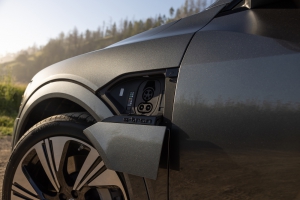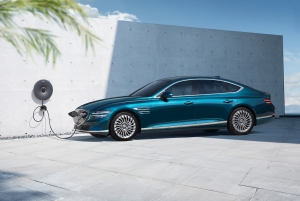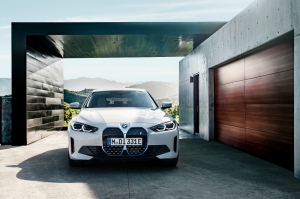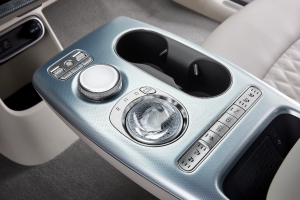2024 Audi Q8 e-tron EV delivers classy design, powerful drive
Electric vehicles continue to generate news, specifically regarding how ready the public are to adopt them en masse.
But in the luxury realm of vehicles, many automakers are fully committed to making EVs a priority, and Audi is one that fits that category — planning to make all new vehicle offerings electric by 2026, and completely electrify its vehicle lineup by 2033.
At the moment, they have several EV options for sale, and I recently spent some time behind the wheel of their flagship EV — the 2024 Audi Q8 Sportback e-tron.
Improved for 2024 with a more powerful battery and longer range, improved aerodynamics, as well as some styling updates, the Q8 e-tron aims to be one of the main options for people looking to join the ranks of luxury EV ownership.
Read on for a full breakdown of what it has to offer and how well it competes in the overall EV landscape vs. rivals from BMW, Genesis, Jaguar and more.
Genesis Electrified G80 sedan sets high standard for luxury EVs
The Genesis brand, which has made major moves in the luxury car world for the past half-decade or so, is making a heavy move toward EVs.
They see the future is electric, and already offer multiple EV options, both on the SUV and sedan side of the business.
When it comes to the Genesis sedan lineup, the vehicle that began this transition is the midsize G80 sedan. Genesis first launched an Electrified G80 variant for the 2023 model, which carries over to 2024. What’s interesting about this particular model is there isn’t some radical new design offered, instead they are keeping the standard G80’s looks essentially intact, and swapping in electric power.
Read on for a breakdown of how well the Electrified G80 holds up in the growing luxury EV market.
BMW i4 offers luxury looks and sporty ride, all in an EV package
BMW has been a longtime supporter of electric vehicles in the luxury realm, dating back to the quirky little i3 a decade ago. And they have stepped up their game with recent EV models that are much closer in design and performance to their regular lineup than ever before.
I recently tested one of those offerings, the BMW i4 — their entry in the compact EV sedan category, which is significant since so many new EVs are focused on SUV lineups. (NOTE: I tested a 2022 BMW i4 eDrive40, which transferred to 2023 with only minor changes)
LOOKS
The BMW i4 is a small EV sedan — based on the longtime favorite 3-series sedan and the 4-series Gran Coupe — with a hatchback-style trunk. It features a sleek, eye-catching exterior design that visually tops the looks of the few EV sedans available in the luxury realm, such as the Tesla Model 3 and Polestar 2.
BMW’s kidney-style grille will continue to polarize opinions, with some loving it while many loathe it, but I thought it fit well with the overall design. The Mineral White Metallic paint on my test vehicle was also very sharp, and the power glass moonroof lets the sun shine in.
Groundbreaking 2023 Genesis GV60 embraces the future
As the number of EV models grows, with dozens of launches expected every year, different models will be embraced by different target groups.
The luxury side of the EV market is especially competitive, but one brand taking the fight to that sector with full force is Genesis, the luxury brand launched by Hyundai several years ago.
Well-established already as a respected luxury competitor on the ICE side of things, Genesis is fully embracing the transition to EVs, and the first salvo in that transition was their launch of the 2023 Genesis GV60, a compact luxury crossover that features a cutting edge design and technology and puts the competition on notice — and that competition is not shabby, including the Volvo XC40 Recharge and Tesla Model Y.
I recently tested a 2023 Genesis GV60, and I’m back with a full report on how it holds up in the competitive EV market — and how Genesis is doing its part to push forward key technological advances that will change the way we drive.
News Categories
Popular Tags
Search Reviews by Make

AutoTechReviews is your home for In-depth reviews of the latest cars, trucks, and SUVs; information on all the emerging vehicle technology; and breaking news from the world of NASCAR and other motorsports.




